5 Best Solidity IDE Editors
We’re reader-supported; we may earn a commission from links in this article.
As a new developer, choosing the best Solidity Integrated Development Environment (IDE) can be a daunting task, given that web3 stuff is already so difficult!
There are many different Solidity Integrated Development Environments (IDEs) to choose from, with each one having its own set of features and drawbacks.
In this article, we will take a look at the 5 Best Solidity IDEs and compare them head-to-head.
I will also provide a brief description of each integrated Development Environment, as well as its key features and cons. Finally, we will give you our bottom line on each IDE.
Without further ado, let’s get started!
How to Choose a Solidity IDE?
When choosing a Solidity IDE, there are a few things you should keep in mind:
- Ease of use: The IDE should be easy to use, with a familiar syntax that is similar to JavaScript.
- Features: The IDE should have all of the features you need, including syntax highlighting, auto-completion, code formatting, and debugging support.
- Compatibility: The IDE should be compatible with your operating system and Ethereum client.
- Price: Some IDEs are free, while others have a price tag. Make sure to choose one that fits your budget.
What is the Best Solidity IDE?
Picking the right Solidity IDE is important, as it can vary based on your previous experience and use cases.
Here are my reviews for the best Solidity IDEs:
1. EthFiddle
Best Solidity IDE for Beginners
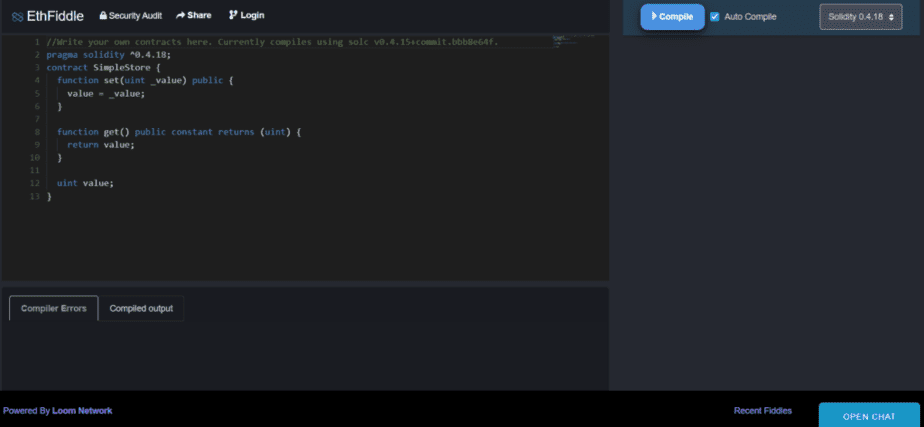
EthFiddle is a browser-based Integrated Development Environment that allows you to write, compile, and test Solidity smart contracts.
One of the key advantages of EthFiddle is that it allows you to easily share your code snippets with others. This is a great feature if you want to get feedback on your code or simply show off your work.
Key Features:
One of the key features of EthFiddle is its “fiddles”, which are basically templates for common Solidity patterns. This can be extremely helpful for newbies who are just starting out with Solidity.
EthFiddle also has a “solidityfmt” feature, which automatically formats your code according to the Solidity style guide. This can be a lifesaver when it comes to debugging your code!
Cons:
EthFiddle can be a bit slow and sluggish at times. Additionally, the interface is not as user-friendly as some of the other IDEs on this list.
Bottom line:
EthFiddle is a great IDE for those just starting out with Solidity. The fiddles feature is particularly helpful for newbies. However, the slow performance and lack of a user-friendly interface may be a turnoff for some users.
2. Visual Studio Code with Solidity Extension
Best Overall Solidity IDE
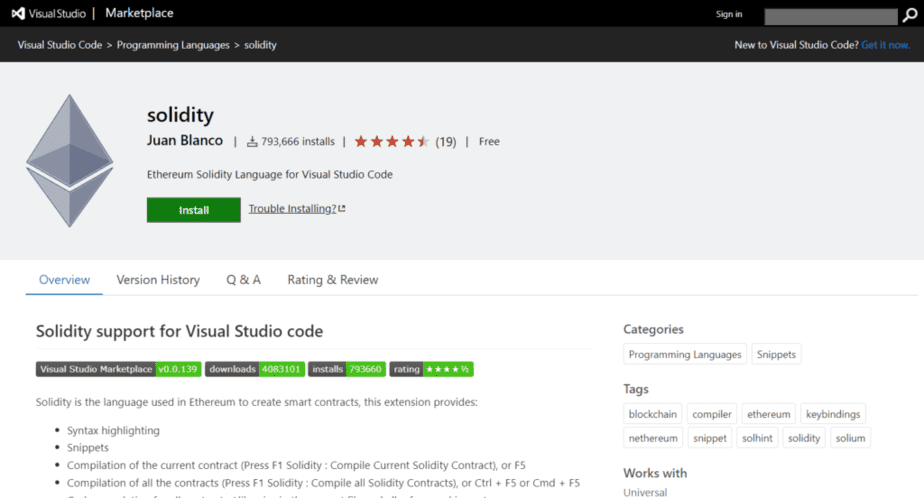
Visual Studio Code (VS Code) is a popular code editor that can be used for a variety of programming languages, including Solidity through a Solidity plugin.
VS Code is a familiar development environment for many including those using it for an app or mobile development in Python or other programming languages.
Many programmers will immediately recognize this IDE because it’s been used to write code in a high-level programming language such as Python.
The Solidity extension for Visual Studio Code makes it easy to continue using the same IDE if you are a developer already.
The extension adds syntax highlighting, code completion, and other features to make developing smart contracts easier.
Key Features:
One of the key features of the Solidity extension is its “solidity-lint” feature, which highlights potential errors in your code. This can be a great help when it comes to debugging your smart contracts.
The extension also supports “contract coverage”, which allows you to see how much of your code is covered by tests. This is a great way to ensure that your contracts are thoroughly tested before deployment.
Cons:
The Solidity extension can be a bit buggy at times. Additionally, the documentation is not as comprehensive as some of the other IDEs on this list.
Bottom line:
The Solidity extension for Visual Studio Code is a great option for those who are already familiar with Visual Studio Code. The solidity-lint and contract coverage features are particularly helpful. However, the bugs and lack of documentation may be a turnoff for some users.
3. Remix IDE
Best Browser-based Solidity IDE
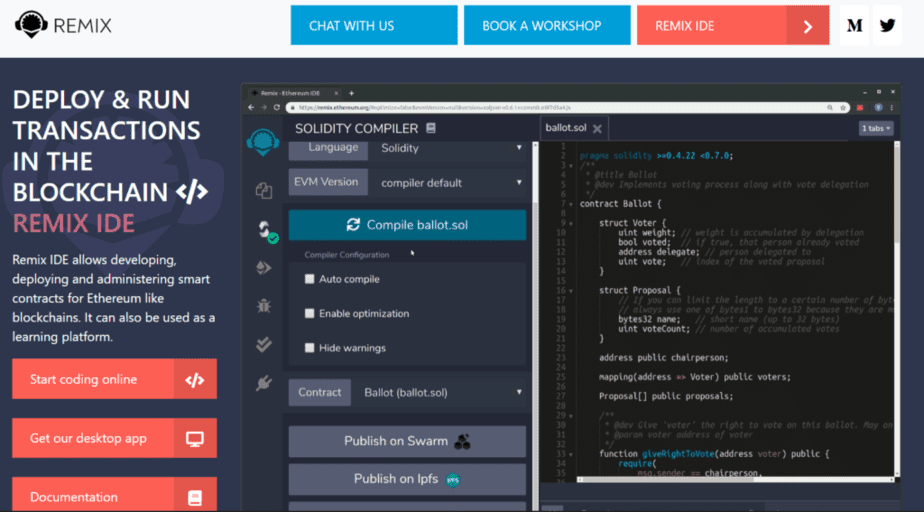
Remix IDE is a browser-based IDE that allows you to write, compile, and debug Solidity smart contracts.
Remix IDE is part of the Remix project developed by the Ethereum Foundation and is one of the most popular IDEs for Solidity development.
Key Features:
- The “personal mode” allows you to connect to a local node
- The “solidity compiler” allows you to compile your code without leaving the IDE. This can be a great time-saver when it comes to compiling your contracts.
- The “debugger” feature allows you to step through your code and see what is happening at each stage. This can be extremely helpful when trying to find bugs in your contracts.
Cons:
Remix IDE can be a bit slow and sluggish at times. Additionally, the interface is not as user-friendly as some of the other IDEs on this list.
Bottom line:
Remix IDE is a great IDE for those just starting out with Solidity. The solidity compiler and debugger features are particularly helpful.
However, the slow performance and lack of a user-friendly interface may be a turnoff for some users.
If you like using a browser, I will recommend smart contract developers use this particular IDE from the Remix project to develop smart contracts on a browser.
4. Hardhat
Best Solidity IDE for Developers Familiar With CLI
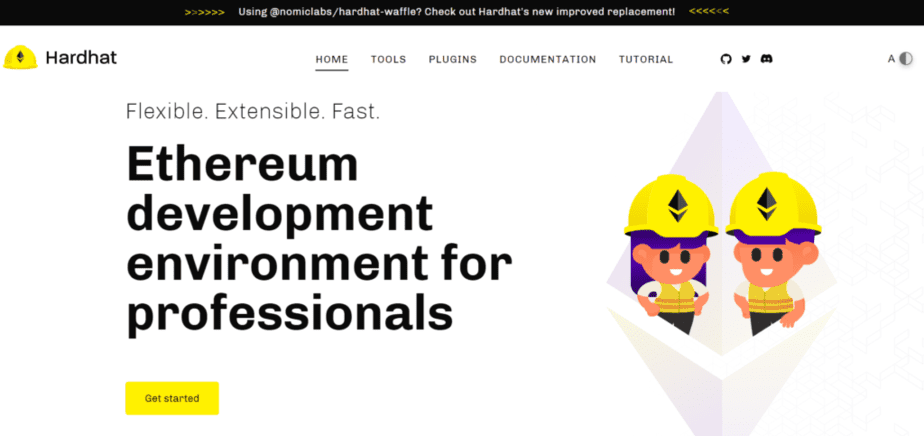
Hardhat is a command-line tool that allows you to develop, test, and deploy Solidity smart contracts.
Hardhat was developed and supported by the Ethereum Foundation and is one of the most popular tools for developing smart contracts.
Key Features:
One of the key features of Hardhat is its “workspaces” feature, which allows you to manage multiple projects from a single command-line interface. This can be a great way to keep your projects organized and avoid confusion.
Hardhat also has a “testing” feature, which allows you to write unit tests for your smart contracts. This is a great way to ensure that your smart contracts are thoroughly tested before deployment.
Cons:
Hardhat can be a bit difficult to use for those who are not familiar with the command-line interface. Additionally, the documentation is not as comprehensive as some of the other IDEs on this list.
Bottom line:
Hardhat is a great tool if you are already familiar with the command-line interface. The workspaces and testing features are particularly helpful. However, the learning curve and lack of documentation may be a turnoff for some users.
5. IntelliJ IDEA
Best Java-based IDE
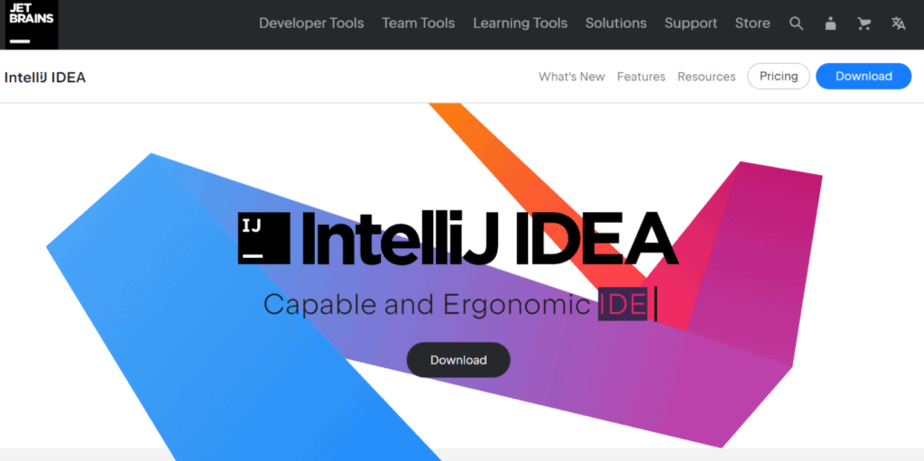
IntelliJ IDEA is another popular Java-based IDE that offers support for Solidity development. It includes features such as syntax highlighting, code completion, refactoring, debugging, and unit testing.
IntelliJ IDEA also has a paid subscription model that offers additional features such as team collaboration tools and project management capabilities.
Key Features:
One of the key features of IntelliJ IDEA is its “code completion” feature, which allows you to automatically complete your code as you type. This can be a great time-saver when writing contracts.
IntelliJ IDEA also has a “refactoring” feature, which allows you to make changes to your code without breaking it. This can be extremely helpful when making changes to large contracts.
Cons:
IntelliJ IDEA can be a bit difficult to use for those who are not familiar with Java-based IDEs. Additionally, the paid subscription model may be a turnoff for some users.
Bottom line:
IntelliJ IDEA is a great IDE for those who are already familiar with Java-based IDEs. The code completion and refactoring features are particularly helpful. However, the learning curve and subscription model may be a turnoff for some users.
What Is Solidity?
Solidity is a contract-oriented, high-level language for writing and deploying smart contracts on the Ethereum blockchain. It was designed to target the Ethereum Virtual Machine (EVM), and provides developers with a familiar, easy-to-use syntax that is similar to JavaScript.
Solidity is also statically typed, which means that it can detect errors in your code before you deploy it. This is a huge advantage, as it can save you a lot of time and money in the long run.
What Is an Integrated Development Environment (IDE)?
An Integrated Development Environment (IDE) is a software application that provides developers with all of the tools they need to write, test, and deploy their code.
Solidity Integrated Development Environments (IDEs) typically provide features such as syntax highlighting, auto-completion, code formatting, and debugging support. They can also be used to write smart contracts, then compile and deploy them to a blockchain.
Software developers use IDEs as essential tools to code Ethereum smart contracts on the Ethereum blockchain.
What are Smart Contracts?
A smart contract is a self-executing digital contract that contains the terms of an agreement between two parties. The contract is written in code and is stored on a blockchain network. When certain conditions are met, the contract automatically executes the agreed-upon terms.
This eliminates the need for intermediaries like lawyers or banks to enforce the contract.
Smart contracts are transparent, secure, and tamper-proof, making them useful in a wide range of industries, including finance, real estate, and supply chain management.
Final Thoughts
These are the five best Solidity IDEs for easy Ethereum development. Each IDE has its own set of features, pros, and cons. Be sure to choose the IDE that best suits your needs.
Whichever Solidity IDE you choose, smart contract development of all the IDEs is still very similar, so you’ll still be able to build decentralized applications (dApps) all the same.
Please feel free to share this article if you found it helpful. 🙂
Thank you for reading!

Justin Chia
Justin is the author of Justjooz and is a data analyst and AI expert. He is also a Nanyang Technological University (NTU) alumni, majoring in Biological Sciences.
He regularly posts AI and analytics content on LinkedIn, and writes a weekly newsletter, The Juicer, on AI, analytics, tech, and personal development.
To unwind, Justin enjoys gaming and reading.


